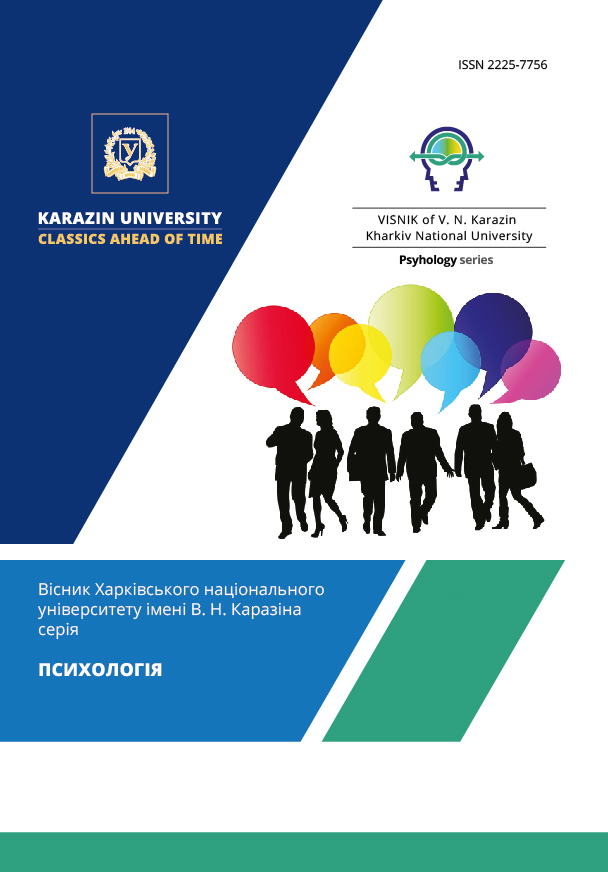THE RELATIONSHIP BETWEEN EMOTIONAL INTELLIGENCE AND LEADERSHIP QUALITIES IN STUDENTS
Abstract
In this article, the main approaches concerning the problem of leadership traits formation as studied in both national and foreign literature are viewed. There are given results of research on leadership traits in students at technical specialties and humanities in the course of their training at a higher education institution in their connection with emotive intellect. The peculiarities of leadership traits in the tested groups with different level of emotive intellect, as well as a connection between leadership traits and emotive intellect are determined. The highest indicators according to the results of the research are demonstrated by a group of students of technical specialties with a high level of emotional intelligence, which indicates the ability to manage their emotions and behavior, the ability to solve problems. They demonstrate a high level of organizational skills, ability to work with a group. Their actions are aimed at achieving goals. The lowest rates according to the results of the study were found in a group of students of humanities with a low level of emotional intelligence. In difficult situations, it is difficult for them to find a way out. They do not know how to control the work of their comrades, to find common ground with people. The relationship between emotional intelligence and leadership skills in students of technical and humanities has been studied. A group of technical students with a high level of emotional intelligence found positive correlations between emotional intelligence and all scales of leadership qualities. There are no correlations between emotional intelligence and leadership qualities in the group of humanities students with a low level of emotional intelligence. In other groups of students, certain correlations have been established between emotional intelligence and leadership qualities.
Downloads
References
Андреева И. Н. Концептуальное поле понятия «эмоциональный интеллект» / И. Н. Андреева // Вопросы психологии. – 2009. – № 4. – С. 131.
Выготский Л. С. Психология/ Л. С. Выготский. – СПб. : Изд-во«Речь», 2010. – 1004 с.
Гоулман Д. Эмоциональный интеллект. Почему он может значить больше, чем IQ / Д. Гоулман;пер. с англ. А. Исаева. – 2-е изд. – М. : Манн, Иванов и Фербер, 2013. – 560 с. URL: https://balka-book.com/files/2017/02_13/16_42/u_files_store_3_228337.pdf
Деревянко С. П. Роль эмоционального интеллекта в процессе социально-психологической адаптации студентов / С. П. Деревянко // Инновационные образовательные технологии. – 2007. – № 1(9). – С. 92-95.
Кипнис М. Тренинг лидерства / М. Кипнис. – М.:Ось-89, 2006. – 144 с.
Гура Т. Психологія лідерства в бізнесі [Електронний ресурс] : навч. посіб. / Т. Гура, О. Романовський, А. Книш ; Нац. техн. ун-т «Харків. політехн. ін-т». – Харків : Друкарня Мадрид, 2017. – 100 с. – Режим доступу: http://repository.kpi.kharkov.ua/handle/KhPI-Press/36679.
Кови С. 7 навыков высокоэффективных людей [Электронный ресурс] / Кови С. // Книги онлайн. – Режим доступа: https://online-knigi.com/page/259016.
Леонтьев Д. А. Психология смысла/ Д. А. Леонтьев. – М. : Смысл, 2003. – 216 с.
Манойлова М. А. Эмоциональный интеллект будущего педагога: акмеологическая диагностика и методы развития / М. А. Манойлова. – М. : Poleograff press, 2008. – 128 с.
Мещерякова И. Н Формирование эмоционального интеллекта студентов-психологов в процессе обучения в ВУЗе / И. Н. Мещерякова // Вестник Тамбовского университета. Серия: Гуманитарные науки. – 2010. – Вып. 1 (81). – С. 157-161. URL:https://cyberleninka.ru/article/n/formirovanie-emotsionalnogo-intellekta-studentov-psihologov-v-protsesse-obucheniya-v-vuze/viewer
Рубинштейн С. Л. Основы общей психологии / С. Л. Рубинштейн. – СПб.: Питер, 2015. – 705 с. URL: http://library.kpi.kharkov.ua/files/new_postupleniya/rubinshteynosnob.pdf
Теорія і практика формування лідера : навч. посіб. / О. Г. Романовський, Т. В. Гура, А. Є. Книш, В. В. Бондаренко. – Харків : Друкарня Мадрид, 2017. – 100 с. – Режим доступу: http://repository.kpi.kharkov.ua/handle/KhPI-Press/31806.
Уткин Э. А. Курс менеджмента : учеб. для вузов / Э. А. Уткин. – М.:Зерцало, 2000. – 448 с.
Bar-On R. The Emotional Intelligence Inventory (EQ-i) : Technical Manual/ Bar-On R. – Toronto: Multi-Health Systems, 1997.
Dabke D. Impact of Leader’s Emotional Intelligence and Transformational Behavior on Perceived Leadership Effectiveness: A Multiple Source View / Dabke D. // Business Perspectives and Research. – 2016. – Vol. 4(1). – P. 27-40. https://doi: 10.1177/2278533715605433
Edelman P. Emotional intelligence, management of subordinate’s emotions, and leadership effectiveness / Edelman P., van Knippenberg D. // Leadership & Organization Development Journal. – 2018. – Vol. 39, No. 5. – P. 592-607. https://doi: 10.1108/LODJ-04-2018-0154.
Lee Y. H. Emotional intelligence, emotional labor, coach burnout, job satisfaction, and turnover intention in sport leadership / Lee Y. H., Chelladurai P. // European Sport Management Quarterly. – 2017. – Vol. 18(4). – P. 393-412. https:// doi: 10.1080/16184742.2017.1406971.
Miao C. Emotional intelligence and authentic leadership: a meta-analysis / Miao C., Humphrey R. H., Qian S. // Leadership & Organization Development Journal. – 2018. – Vol. 39, No. 5. – P. 679-690. https:// doi: 10.1108/LODJ-02-2018-0066.
Mayer J. D. Models of Emotional Intelligence / Mayer J. D., Salovey P., Caruso D. R. // Handbook of Intelligence / ed. by R. Stenberg. – New York : Cambridge University Press, 2000. – P. 396-420.




